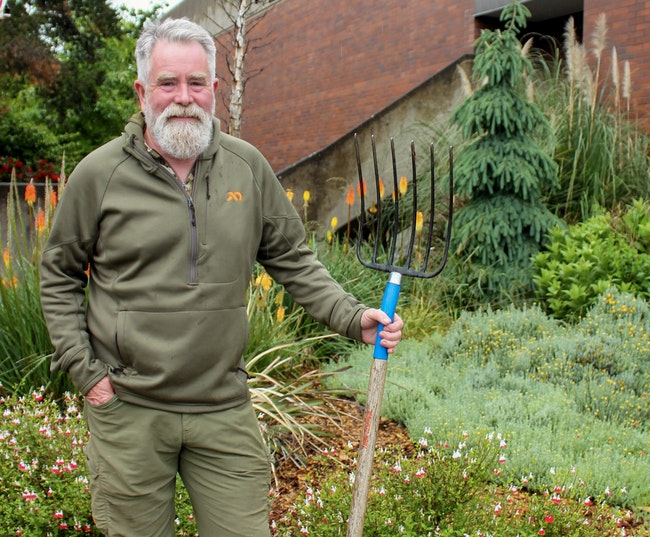
Willamette University grounds manager Jim Andersen stands in a mulched bed of hardy, pollinator-attractive perennials (Helen Caswell/Special to Salem Reporter)
Willamette University and its groundskeepers gained national recognition this spring for having nearly eliminated synthetic pesticide use on campus.
The acknowledgement came from Herbicide Free Campus, a project founded by students at the University of California, Berkeley, which promotes a toxin-free environment by focusing on organic landscape care on U.S. university campuses.
It took many years and significant planning to transition Willamette’s conventional landscape care to more organic practices, said Jim Andersen, grounds manager at Willamette University. The university was using more than 58 pesticides when he started in 2007, he said.
“I had just had a son, and I thought the work might be able to be done a different way,” he said. “We were using so many sprays and pesticides on campus, it just seemed the right thing to me.”
The Herbicide Free Campus report shows that transitioning to organic land care can result in water and cost savings. At Willamette, Andersen estimated that the university now saves about $2,000 per year and has reduced landscaping water by 25 to 30%.
Herbicide Free Campus singled out eight institutions for recognition. The others were Harvard University; Cascadia College and University of Washington, Bothell; Seattle University; University of California Berkeley; Reed College of Portland; University of Colorado, Boulder and University of Texas, Austin.
Back in 2007, the landscape team began with organic herbicides and moved on to controlling weeds by mowing and weed whacking, weeding by hand and mulching. Andersen credited Dean Wentworth, hired at Willamette as the “botanical curator,” with even more strategies to combat unwanted plants.
“Dean helped make the transition easier,” Andersen said. “He really knew where to plant plants. People don’t notice dandelions if there is another pretty grass in the same area.” While Willamette University lawns appear trim and uniform from a distance, a closer look shows a variety of grasses.
 Dean Wentworth, botanical curator at Willamette University for 18 years, said that transitioning away from toxic garden chemicals meant taking a more holistic view of the landscape (Helen Caswell/Special to Salem Reporter)
Dean Wentworth, botanical curator at Willamette University for 18 years, said that transitioning away from toxic garden chemicals meant taking a more holistic view of the landscape (Helen Caswell/Special to Salem Reporter)
Wentworth, who retired in 2018, said he also brought in species that would attract the beneficial natural predators of insect pests. “We planted the landscape so that there was always something in bloom for butterflies, hummingbirds and for predators,” he said. “I know that bushtits travel in flocks and forage together. One day I saw them eating aphids off a certain bush, and decided then and there we had to plant that (bush) on campus, to attract these birds to help manage our aphids.”
This kind of practice doesn’t work as well when toxic pesticides are used on a landscape, Wentworth said. “If you get in the cycle of spraying pesticides, you get addicted to it because when you spray, you are also getting rid of the birds and wildlife that can help you. So because you are killing your helpers, it turns out you just have to spray over and over again,” he said.
Wentworth even employed geese and campus ducks to help him manage slugs on the property. “I don’t personally go out and kill anything,” he said, “but when I’d go out on my rounds, I’d collect slugs as I went.” The ducks, seeing this, would follow until he tossed them the slugs.
“We had it worked out,” he remembered, smiling.
 Judicial planting and thoughtful maintenance practices mean that fewer toxic chemicals need to be used on the lawns and flower beds at Willamette University (Helen Caswell/Special to Salem Reporter)
Judicial planting and thoughtful maintenance practices mean that fewer toxic chemicals need to be used on the lawns and flower beds at Willamette University (Helen Caswell/Special to Salem Reporter)
Wentworth has never used herbicides or pesticides in any of his personal gardens. “Overall the predators keep everything under control, but really, our job is to stand back and not interfere” he said.
He described a forest service night camera showing a deer leaning close to the ground so a possum could pick off the ticks from its face. “There are so many relationships like that out there that we don’t even have a clue about,” he said. “If we just pay attention, we can use all that.”
The only non-organic herbicide still in use on the Willamette campus is Roundup, applied sparingly in an industrial part of the campus. Andersen appreciates that Willamette allowed him and his team to transition away from the multiple toxics he started out with. “I’m just glad they thought it was acceptable,” he said.
The recognition from Herbicide Free Campus was gratifying, Andersen said, especially since “we’ve only heard that everything looks better now. These practices we’ve been developing seem to have taken on, and at this point, they seem to be the only way to move forward,” he said. “And, that makes me happy.”
 Jim Andersen, Willamette University grounds manager, points to the downward sloping funnel shape of torch lily petals, a design uniquely suited for beneficial hummingbirds (Helen Caswell/Special to Salem Reporter)
Jim Andersen, Willamette University grounds manager, points to the downward sloping funnel shape of torch lily petals, a design uniquely suited for beneficial hummingbirds (Helen Caswell/Special to Salem Reporter)
Writer Helen Caswell can be reached at [email protected].
Story idea? Tip? Contact Salem Reporter by email: [email protected].
JUST THE FACTS, FOR SALEM – We report on your community with care and depth, fairness and accuracy. Get local news that matters to you. Subscribe to Salem Reporter starting at $5 a month. Click I want to subscribe!









